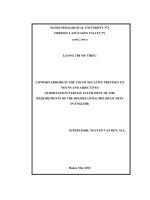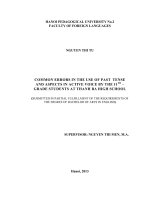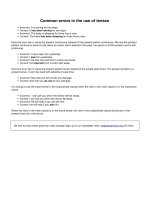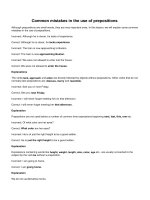Common mistakes in the use of pronouns
Bạn đang xem bản rút gọn của tài liệu. Xem và tải ngay bản đầy đủ của tài liệu tại đây (8.99 KB, 2 trang )
Common mistakes in the use of pronouns
In this article we will take a look at some common mistakes in the use of pronouns.
Incorrect: Each of these boys play cricket well.
Correct: Each of these boys plays cricket well.
Incorrect: Each of these three roads lead to the railway station.
Correct: Each of these three roads leads to the railway station.
After each of we use a plural noun or pronoun and a singular verb.
Incorrect: Both didn’t go.
Correct: Neither went.
In negative sentences we do not normally use both. Instead, we use neither.
Incorrect: We all did not go.
Correct: None of us went.
In negative sentences we do not normally use all. Instead, we use none.
Incorrect: Each boy and each girl were given a book.
Correct: Each boy and each girl was given a book.
Incorrect: Have you got a pen? I haven’t got.
Correct: Have you got a pen? I haven’t got one.
The verb get needs to be followed by an object.
Incorrect: My all books are lost.
Correct: All of my books are lost.
Incorrect: Let I go.
Correct: Let me go.
Incorrect: Let we move.
Correct: Let us move.
Let is a verb. It should be followed by a pronoun in object form.
Incorrect: Your problem is bigger than me.
Correct: Your problem is bigger than mine.
Correct: Your problem is bigger than my problem.
Incorrect: Whoever does best he will get a prize.
Correct: Whoever does best will get a prize.
Incorrect: I and he are brothers.
Correct: He and I are brothers.
Incorrect: I and Mark are friends.
Correct: Mark and I are friends.
Pronouns should go in the proper order – the person spoken to, first; the person spoken of, second and the
speaker, third.
Stay on top of your writing! Download our grammar guide from www.englishgrammar.org to stay up-to-date.
Powered by TCPDF (www.tcpdf.org)









